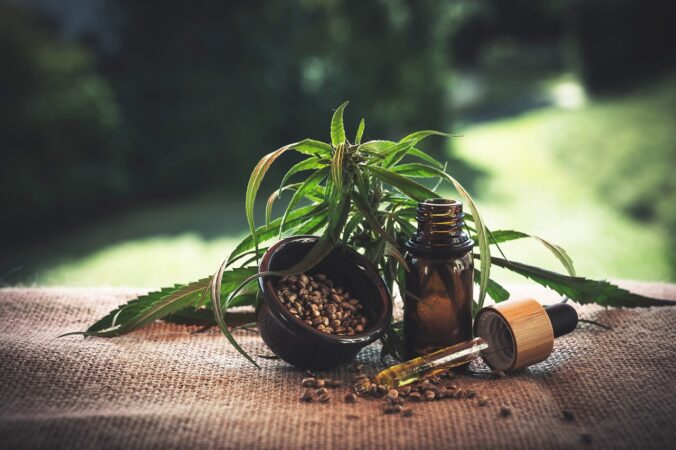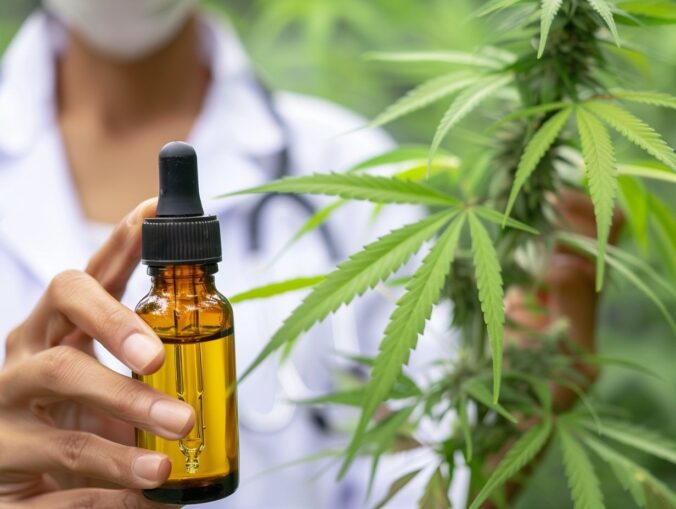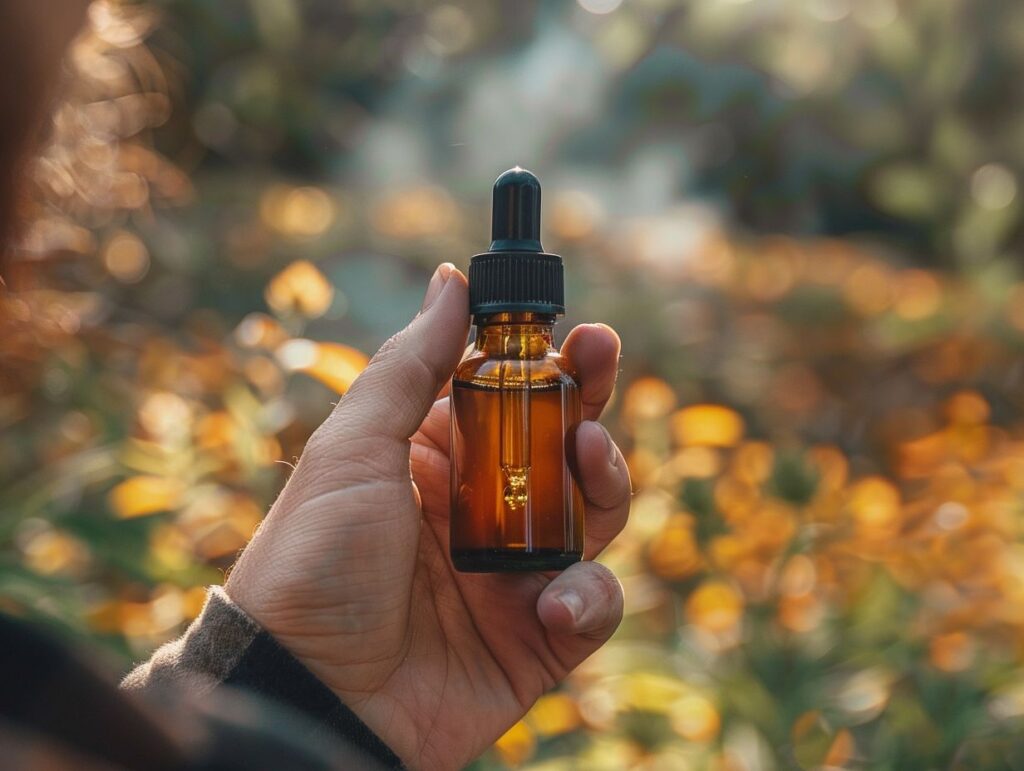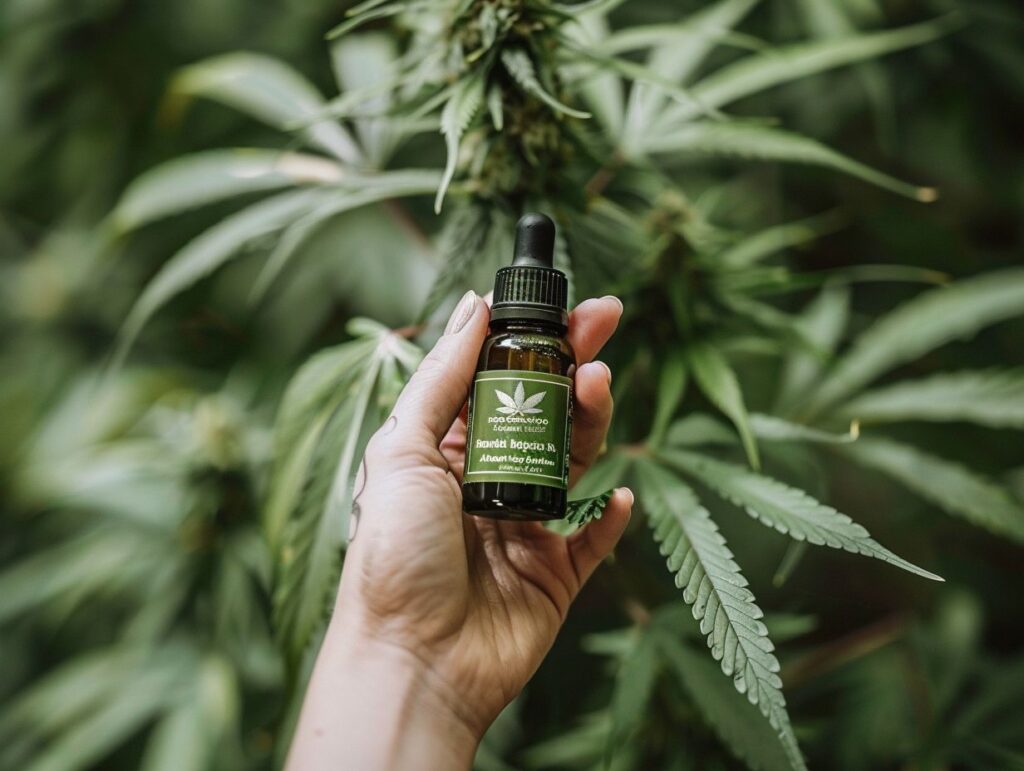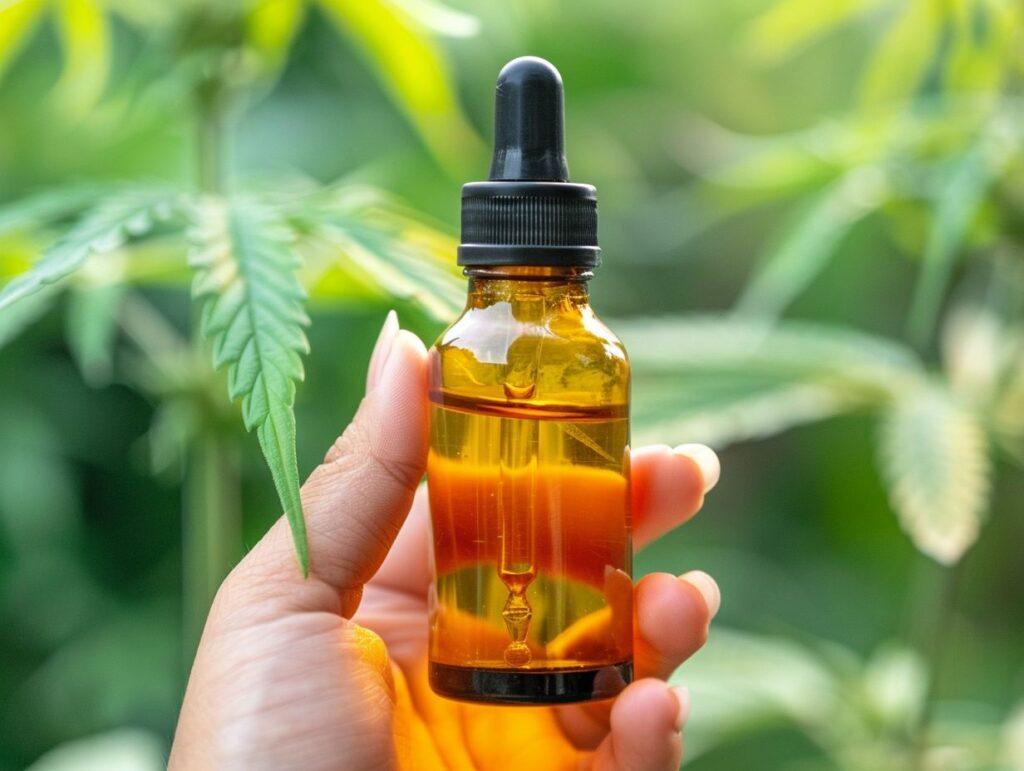Curious about CBD but not sure where to start?
- We break down the differences between full-spectrum, broad-spectrum, and isolate CBD products.
- From understanding how each type is made to exploring their unique benefits and uses, we’ve got you covered.
- Whether you’re looking to relieve pain, reduce anxiety, or simply improve your overall wellness, we’ll help you navigate the world of CBD to find the right product for your needs.
Let’s dive in and discover which type of CBD is right for you!
What is CBD?
CBD, or cannabidiol, is a natural compound found in cannabis plants, known for its potential health and wellness benefits. Unlike THC, another compound in cannabis, CBD is non-psychoactive, meaning it does not produce a ‘high‘. CBD interacts with the body’s endocannabinoid system, influencing various functions like pain perception, mood, and inflammation. People use CBD products for relief from anxiety, chronic pain, insomnia, and other health issues, seeking a natural alternative to traditional medicine.
Research suggests that CBD’s properties go beyond symptom management, with studies indicating its potential in neuroprotection and anti-inflammatory effects. The origins of CBD trace back to the hemp plant, a variety of cannabis that is legally cultivated for industrial purposes. With its increasing popularity, CBD has become a staple in the wellness industry, offering a more holistic approach to health. The diverse range of cannabinoids present in cannabis, including CBD, contributes to the entourage effect, enhancing the overall therapeutic benefits of the plant compounds.
What are the Different Types of CBD Products?
The CBD market offers a variety of products catering to different preferences and needs, including full-spectrum, broad-spectrum, and isolate CBD products. Full-spectrum CBD contains all plant compounds, including cannabinoids, terpenes, and THC (within legal limits). Broad-spectrum CBD retains most compounds but removes THC entirely. CBD isolate is the purest form, containing only CBD without any other cannabinoids or plant compounds.
Each type of CBD product has its unique benefits and applications. Full-spectrum CBD, with its complete array of compounds, is believed to produce an “entourage effect,” where the components work synergistically for enhanced effects. Broad-spectrum CBD offers a similar entourage effect without the presence of THC, making it suitable for those concerned about THC consumption. On the other hand, CBD isolate, being 99% pure CBD, is preferred by individuals who want to avoid even trace amounts of THC. The extraction process plays a crucial role in determining the quality and potency of CBD products, with methods like CO2 extraction and ethanol extraction being commonly used in the industry.
Full-Spectrum CBD
Full-spectrum CBD products contain a diverse range of cannabinoids, terpenes, and other beneficial compounds present in the cannabis plant, including THC (in legal amounts). The ‘entourage effect’ suggests that these compounds work together synergistically to enhance the overall therapeutic effects of CBD, promoting holistic wellness and potentially more potent outcomes.
The cannabinoids found in full-spectrum CBD, such as CBD, THC, CBG, CBN, and others, each play a unique role in interacting with our body’s endocannabinoid system. Terpenes, the aromatic oils that give cannabis its distinctive smell, further enrich the product by offering their own therapeutic benefits.
It is crucial to note that the extraction process plays a pivotal role in preserving the delicate balance of these compounds, ensuring maximum efficacy. High-quality extraction methods, like CO2 extraction, help maintain the integrity of the entourage effect, amplifying the potential health benefits of full-spectrum CBD.
Broad-Spectrum CBD
Broad-spectrum CBD products offer a similar range of cannabinoids, terpenes, and plant compounds as full-spectrum CBD but without the presence of THC. The extraction process for broad-spectrum CBD involves removing THC while retaining the beneficial components of the plant, ensuring high purity and legal compliance.
This unique extraction method allows broad-spectrum CBD to offer a wide array of potential health benefits without the psychoactive effects associated with THC. By carefully preserving cannabinoids and terpenes, manufacturers can harness the entourage effect, where these compounds work together to enhance the overall therapeutic properties of the product. The absence of THC also caters to individuals who may be sensitive to the psychoactive compound or restricted by regulations that prohibit THC consumption, making broad-spectrum CBD a versatile and accessible option for many consumers.
CBD Isolate
CBD isolate products are the purest form of CBD, with 99% pure CBD content and no other cannabinoids or plant compounds.
This level of purity makes CBD isolate products highly sought after for those seeking precise dosing and wanting to avoid any trace of THC. The extraction process for CBD isolate typically involves either ethanol extraction or CO2 extraction methods, which are known for their ability to separate CBD from the rest of the plant material. Lab testing plays a crucial role in verifying the absence of impurities and confirming the concentration of CBD in the final product, providing consumers with confidence in the quality and potency of what they are purchasing.
How are these CBD Products Made?
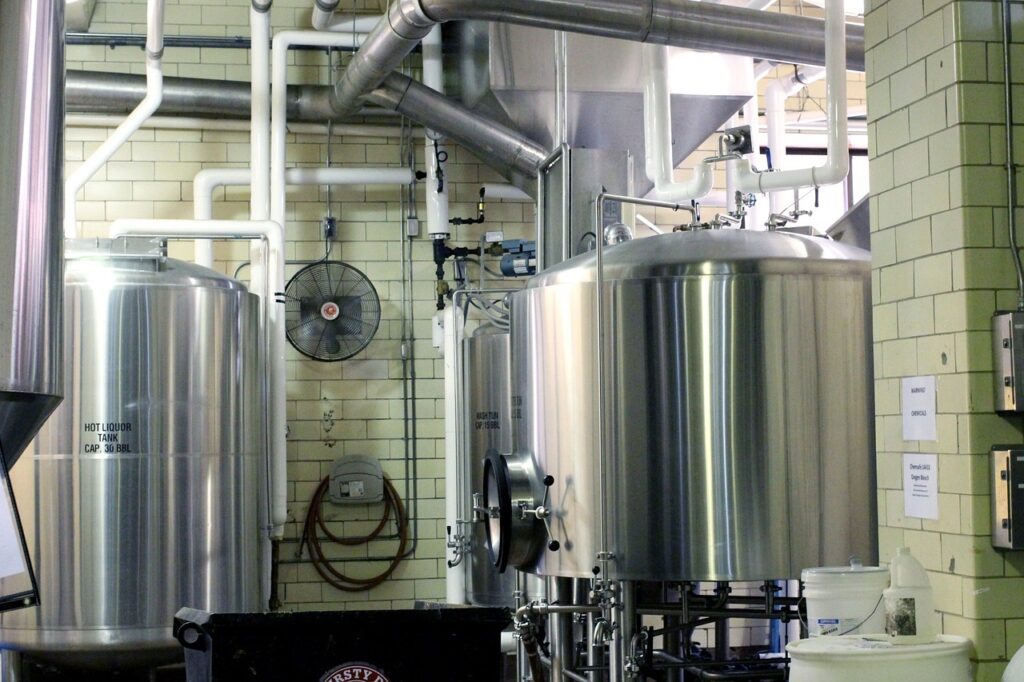
CBD products undergo various extraction methods to obtain CBD from the hemp plant efficiently. One common method is CO2 extraction, known for its ability to maintain the purity and quality of CBD products. Many brands prioritize organic practices, using high-quality plants to ensure the effectiveness and safety of their CBD products.
During the CO2 extraction process, carbon dioxide is used as a solvent to pull out the desired cannabinoids from the hemp plant, leaving no residual solvents behind. This method is gentle and non-toxic, making it a preferred choice for those seeking clean and potent CBD products.
Organic cultivation practices play a crucial role in ensuring the plants are free from harmful chemicals, pesticides, and other contaminants, resulting in a final product that is not only potent but also environmentally friendly.
Full-Spectrum CBD Extraction Process
The extraction process for full-spectrum CBD involves utilizing the entire hemp plant to extract a wide range of beneficial compounds, including cannabinoids, terpenes, and other plant constituents. This method aims to preserve the natural composition of the plant, ensuring the presence of various cannabinoids and plant compounds that contribute to the entourage effect.
Organic extraction methods play a crucial role in this process, as they help maintain the purity of the final product. By utilizing solvent-free extraction techniques, such as CO2 extraction, manufacturers can ensure that no harmful chemicals are introduced during the extraction process.
The holistic benefits of full-spectrum CBD are attributed to the synergistic interactions between cannabinoids, terpenes, and other phytonutrients. These compounds work together to enhance the therapeutic effects of the product, offering a more comprehensive wellness experience.
Broad-Spectrum CBD Extraction Process
The extraction process for broad-spectrum CBD involves extracting a wide array of plant compounds, cannabinoids, and terpenes present in the hemp plant while carefully removing any traces of THC. This method aims to retain the beneficial components of the plant while ensuring high purity and legal compliance.
During the extraction process, various methods such as CO2 extraction, ethanol extraction, or lipid extraction are utilized to separate the desired compounds from the plant material. Once the extraction is complete, further purification steps are taken to eliminate any remaining impurities and isolate the broad-spectrum CBD. The removal of THC is crucial as it is a psychoactive compound that can cause unwanted side effects. By maintaining the natural synergy of cannabinoids and terpenes, broad-spectrum CBD products offer enhanced therapeutic benefits without the risk of psychoactive effects associated with THC.
CBD Isolate Extraction Process
The extraction process for CBD isolate involves isolating pure CBD from the hemp plant, removing all other cannabinoids, terpenes, and plant compounds. This method results in a highly potent CBD product with 99% purity, ideal for users seeking a consistent and controlled CBD experience. Lab testing ensures the quality and potency of CBD isolate products.
Different extraction methods such as CO2 extraction or ethanol extraction are commonly used to achieve this level of purity. These methods involve carefully extracting the CBD while minimizing the presence of other components. Rigorous lab testing is crucial to verify the absence of impurities and ensure that the CBD isolate meets regulatory standards. By isolating CBD in this manner, manufacturers can consistently deliver products that provide users with a reliable and predictable CBD experience.
What are the Differences Between Full-Spectrum, Broad-Spectrum, and Isolate CBD Products?
The key differences among full-spectrum, broad-spectrum, and isolate CBD products lie in their composition and cannabinoid content.
- Full-spectrum CBD products encompass a wide array of cannabinoids and terpenes, contributing to a synergistic effect known as the entourage effect. This means that the combination of various compounds present in full-spectrum CBD can enhance the overall therapeutic benefits.
- On the other hand, broad-spectrum CBD products offer a similar range of cannabinoids and terpenes as full-spectrum but with the absence of THC, making them a suitable option for those who want to avoid any traces of THC in their system.
- CBD isolate, however, is a pure form of CBD devoid of any other cannabinoids or plant components, providing a concentrated dose of CBD without the entourage effect.
Cannabinoid Content
Cannabinoid content varies across different types of CBD products. Full-spectrum CBD contains a broad spectrum of cannabinoids, including THC, while broad-spectrum eliminates THC but retains other beneficial compounds. CBD isolate, on the other hand, consists solely of CBD without any other cannabinoids present.
The presence and combination of cannabinoids in these products play a significant role in their potential effects on the body. Full-spectrum CBD products are believed to offer an entourage effect, where the cannabinoids work together synergistically for enhanced benefits. Meanwhile, broad-spectrum products are popular for those seeking the entourage effect without THC’s psychoactive effects. CBD isolate, with its pure CBD content, may be preferred by individuals who want to avoid all traces of THC and other cannabinoids for various reasons.
THC Content
THC content is a crucial factor distinguishing full-spectrum, broad-spectrum, and isolate CBD products. Full-spectrum CBD may contain THC within legal limits, while broad-spectrum eliminates THC entirely, ensuring zero THC content. CBD isolate is THC-free by definition, making it a preferred option for individuals concerned about THC presence.
Consumers are increasingly mindful of the varying THC levels in different CBD products as regulatory standards play a significant role. The legal limit of THC in CBD products is usually below 0.3%, ensuring compliance with regulations.
Full-spectrum options provide a wider range of cannabinoids, including THC, offering enhanced benefits but may not be suitable for those sensitive to THC. Broad-spectrum products are gaining popularity for their THC-free nature while retaining other beneficial compounds found in full-spectrum CBD.
Understanding the THC content in products can help consumers make informed choices based on their preferences and needs.
Entourage Effect
The entourage effect is a phenomenon associated with full-spectrum CBD, where the combination of various cannabinoids, terpenes, and plant compounds creates a synergistic effect that enhances the therapeutic benefits of CBD. This holistic approach to wellness suggests that the combined presence of these components amplifies the overall impact on the body.
For instance, cannabinoids such as CBD and THC working in tandem with terpenes like myrcene and limonene can lead to heightened anti-inflammatory properties, improved mood regulation, and enhanced pain relief.
The diverse array of compounds in full-spectrum CBD products not only work together to address different health concerns but also act in concert to support the body’s endocannabinoid system, promoting a state of balance and homeostasis.
This comprehensive interaction underscores the idea that the whole plant is greater than the sum of its individual parts, offering a more potent and effective remedy for various conditions.
Potential Benefits and Uses

CBD products offer a range of potential benefits and uses, supported by ongoing research in the wellness and health fields. Commonly reported benefits include relief from pain, anxiety, inflammation, and better sleep quality. The diverse properties of CBD make it a versatile option for addressing various health concerns and promoting overall well-being.
Studies have indicated that CBD may have neuroprotective properties and could potentially help in managing conditions like epilepsy and multiple sclerosis.
Some individuals have reported improvements in their skin conditions such as acne and eczema with the use of CBD-infused products.
The growing popularity of CBD products stems from their natural origin, minimal side effects, and potential to offer a holistic approach to health and wellness.
Which Type of CBD Product is Right for Me?
Choosing the right CBD product involves considering your personal needs, preferences, and desired health outcomes. Factors such as the product’s quality, effectiveness, and intended usage play a significant role in determining which type of CBD product will best suit your requirements.
When selecting a CBD product, it is crucial to prioritize reputable brands that adhere to high manufacturing standards and provide third-party lab testing results to ensure transparency and quality. Understanding the various forms of CBD products, such as oils, edibles, topicals, and capsules, can help match the consumption method with your lifestyle and preferences. It’s also essential to be aware of the CBD concentration, extraction method, and any additional ingredients to make an informed decision that aligns with your expectations and health goals.
Consider Your Personal Needs and Preferences
When choosing a CBD product, consider your specific health needs and preferences. Whether you seek relief from pain, anxiety, or stress, or aim to enhance overall wellness, selecting a CBD product aligned with your personal requirements is crucial for achieving desired outcomes.
Understanding the various forms of CBD products available can help you make an informed decision. Factors such as dosage, method of consumption, and ingredient composition play a significant role in determining the effectiveness of the product for your individual needs.
Conducting thorough research on reputable brands, product reviews, and consulting with healthcare professionals can provide valuable insights into selecting the most suitable CBD product for your health goals.
Consult with a Medical Professional
Before incorporating CBD products into your wellness routine, it is advisable to consult with a medical professional or healthcare provider. They can offer personalized advice based on your health profile, existing conditions, and potential interactions with other medications.
Seeking guidance from a healthcare professional is crucial to ensure that CBD products are used safely and effectively. Healthcare providers can assess any underlying health issues that may impact your response to CBD, ensuring that the products are compatible with your current medications and overall well-being. By working closely with a medical expert, you can establish a tailored plan for integrating CBD into your wellness regimen, optimizing its potential benefits while minimizing any risks or adverse effects. This personalized approach enhances the efficacy and safety of using CBD for your individual needs.
Research the Brand and Product Quality
When selecting a CBD product, research the brand reputation and product quality to ensure you are purchasing from a reputable and trusted source. Explore customer reviews, third-party lab testing results, and industry certifications to validate the quality and authenticity of the CBD products.
These factors are crucial in determining the overall reliability and effectiveness of CBD products. Customer reviews offer real insight into the experiences of other consumers with the product, helping you gauge its potential benefits and drawbacks.
Similarly, third-party lab testing results provide independent verification of the product’s contents and ensure that it meets the promised standards. Looking into the brand’s market reputation can give you a sense of its commitment to quality and customer satisfaction, offering further assurance before making your purchase decision.
Start with a Low Dose and Monitor Effects
When beginning a CBD regimen, start with a low dose to assess your body’s response and tolerance. Monitor the effects closely, noting any changes in symptoms or relief experienced. Gradually adjust the dosage as needed to achieve the desired therapeutic outcomes.
This method allows you to observe how your body interacts with CBD, ensuring that you find the most effective dosage for your unique needs. By monitoring the impact on your symptoms and overall well-being, you can make informed decisions to enhance the benefits of CBD.
Remember, the key is patience – give your body time to adapt and respond positively to the cannabinoid compounds. Consulting with a healthcare professional can further guide you in optimizing your CBD regimen for maximum relief.
Frequently Asked Questions
What is the difference between full-spectrum, broad-spectrum, and isolate CBD products?
Full-spectrum, broad-spectrum, and isolate CBD products are all forms of CBD that differ in their composition and extraction processes. They each have unique characteristics and benefits, making it important to understand their differences before making a purchase.
What is full-spectrum CBD?
Full-spectrum CBD products contain all compounds found naturally occurring in the cannabis plant, including CBD, other cannabinoids, terpenes, and trace amounts of THC (less than 0.3%). This combination of compounds is believed to create an “entourage effect” which enhances the potential benefits of CBD.
What is broad-spectrum CBD?
Broad-spectrum CBD products are similar to full-spectrum, as they also contain multiple compounds found in the cannabis plant. However, broad-spectrum products go through an additional extraction process to remove all traces of THC. This makes them a great option for those who want the potential benefits of multiple compounds without any THC.
What is isolate CBD?
Isolate CBD products are made by extracting and isolating only the CBD compound from the cannabis plant. This results in a pure form of CBD with no other cannabinoids or terpenes present. Isolate CBD products are typically odorless, tasteless, and have no THC.
Which type of CBD product is right for me?
The type of CBD product that is right for you depends on your personal preferences and needs. Full-spectrum products may be effective for those seeking a wide range of potential benefits, while broad-spectrum products are a good choice for those who want to avoid THC. Isolate CBD products are ideal for those who prefer a pure form of CBD with no other compounds.
Are there any risks associated with full-spectrum, broad-spectrum, or isolate CBD products?
While CBD is generally considered safe, it is important to note that full-spectrum products may contain trace amounts of THC which could potentially show up on a drug test. Broad-spectrum and isolate products have a lower risk of this, but it is always best to check the product’s third-party lab results to ensure it contains no THC. Additionally, some people may have allergies or sensitivities to certain compounds found in full-spectrum or broad-spectrum products, so it’s important to consult with a healthcare professional before using.
Can I switch between full-spectrum, broad-spectrum, and isolate CBD products?
Yes, you can switch between different types of CBD products as needed. However, it’s important to consider the potential effects and differences in each product to determine which type best suits your needs. It’s also recommended to slowly introduce new products and monitor how your body responds to them.
